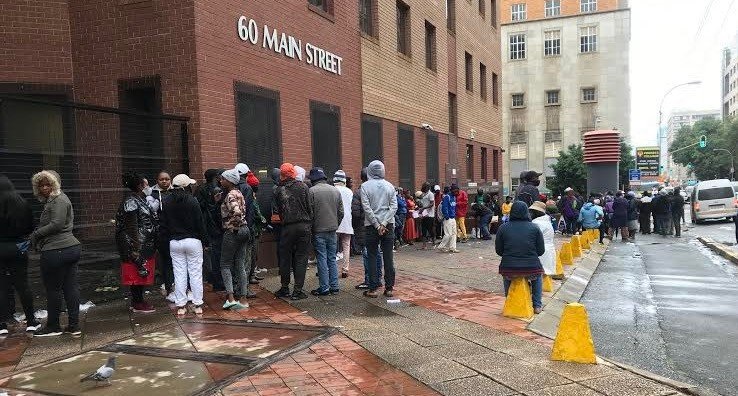
Mikhail Moosa questions whether South Africa can afford to do away with the social relief of distress grant, which came to an end in April, and was the lifeline for many households affected by Covid-19.
Since the beginning of May, millions of South Africans have fallen through the widening gaps in our national safety net.
The government's decision to suspend the social relief of distress (SRD) grant, a grant created during the pandemic to provide a paltry R350 to unemployed people, has left millions of the most economically vulnerable without any state support.
Social grants were an integral part of the economy before the pandemic, but since last year, these monthly payments have become a lifeline for many households.
Amid mounting fiscal strain and without a clear end in sight of the pandemic, the government has decided that it can no longer afford to provide these extraordinary grants.
But can South Africa afford not to continue the SRD grant?
Why was the SRD grant introduced?
The SRD grant was initially introduced as a temporary measure to provide income support during the national lockdown. But the SRD grant was a temporary solution to a long-standing problem.
Most South Africans would prefer to work for a living, rather than rely on the state, but work opportunities are limited, and levels of unemployment have grown precipitously over the last decade.
Social grants have been one of the few successful developmental policies in democratic South Africa. Many studies have shown that expanding the provision of social grants has reduced the depth of poverty and helped reduce income inequality. Despite these successes, social grants have mainly been targeted towards 'deserving' groups of people who cannot support themselves through waged work, namely children, older persons and people with disabilities.
Adults younger than 60 years old, even if they are poor and unemployed, have almost no access to social assistance from the state.
The SRD grant aimed to provide a partial and temporary remedy to this gap in the safety net by targeting unemployed South Africans who did not receive any other grant.
Until there are fundamental changes in the labour market to absorb aspiring job-seekers, social grants will be the most effective means of keeping households afloat.
Why is the SRD grant still needed?
There are three solid arguments for the continuation of the SRD grant or a variation of income support.
First, poor South Africans are legally entitled to receive assistance from the state. Section 27 of the Constitution states that "everyone has the right to have access to social security, including, if they are unable to support themselves and their dependents, appropriate social assistance".
South Africans have a right to social assistance. The pandemic and lockdown economic fallout have meant that this right is now more important than ever before.
READ | Ryland Fisher: Covid-19 special grant: Govt will need to find more money to extend R350 payments
Second, most South Africans would probably support the continuation of the SRD grant.
The 2018 Afrobarometer survey, a nationally representative public opinion survey on governance, found that three in four South Africans agree that the government should provide social grants to the poor. Two-thirds of South Africans agree the state has a duty to take care of poor people. Public support for social assistance was high across all demographics, across lines of race, class and education.
Third, providing additional income support during times of economic crisis is beneficial for both the recipients and the economy. In many instances, the SRD grant was the only way for recipients' households to put food on the table.
Critics of expanding the provision of social grants argue that social assistance costs are high and their financial sustainability is prohibitive. But these arguments tend to emphasise the gross expenses of expenditure and ignore the net benefits of providing an income to grant recipients.
It is far easier to quantify the costs of providing the grant than it is to appreciate how vital R350 might be for millions of households without an income.
Recipients tend to use their grants on food and other essential goods, injecting additional revenue into local communities. Grant money is often used to overcome the financial barriers of looking for work.
Weaving a new safety net
In times of crisis, citizens have a responsibility to hold their government to account and an opportunity to introduce widespread reforms in society. South Africa is among the most unequal countries globally, and inequality is an obstacle to a more cohesive and inclusive nation.
Suspending the SRD grant is an insult to the government's constitutional obligation to support those without adequate income. It flies in the face of public opinion that favours government support for the needy and it is an economic disaster for the poorest in society.
Civil society groups, including the Black Sash and the #PayTheGrants campaign of the C19 Coalition, have been championing the continuation of the SRD grant.
South Africans of all backgrounds should support these initiatives and demand that the state lives up to its constitutional mandate to support the most vulnerable and build a more inclusive society.
- Mikhail Moosa is the Project Leader for the SA Reconciliation Barometer at the Institute for Justice and Reconciliation. His Twitter handle is @Mikhail_Moosa.
*Want to respond to the columnist? Send your letter or article to opinions@news24.com with your name and town or province. You are welcome to also send a profile picture. We encourage a diversity of voices and views in our readers' submissions and reserve the right not to publish any and all submissions received.
Disclaimer: News24 encourages freedom of speech and the expression of diverse views. The views of columnists published on News24 are therefore their own and do not necessarily represent the views of News24.




 Publications
Publications
 Partners
Partners
























